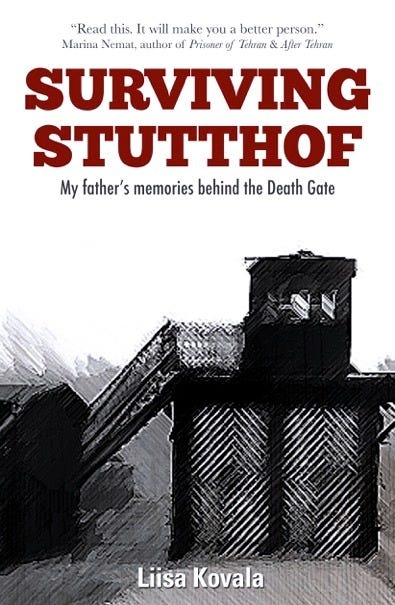From Silent Suffering to Shared History: Writing My Father's WWII Journey
From book idea to publication and beyond.
This year marks the 80th anniversary of the end of World War II, so I’m writing a series of posts about my father’s war experiences and our journey writing Surviving Stutthof: My Father’s Memories Behind the Death Gate together.
It seems hard to imagine that so much time has passed since the war ended, and yet it was also yesterday. As we watch the events of the world unfold, it’s impossible not to think about times gone by and lessons we were meant to learn. For me, it’s not just a distant historical anniversary, it’s a much more recent history and deeply personal.
War reached my father’s hometown of Oulu, Finland in 1939 when he was only eleven, but it was the Russians they were concerned about. While his older brothers went off to fight in the Finnish-Russian Winter War, and later the Continuation War, Aarne first found work at the tender age of thirteen working at the hydro-electric plant, but by age fifteen, he left home for Helsinki, determined to do something, and was hired as a sailor on a merchant marine ship transporting materials between Germany, Poland, and Finland. As with many others, he lied about his age, but they were in desperate need of sailors, so he was hired. In September 1944, three months after his sixteenth birthday, his ship, the S/S Wappu was detained in Gdańsk, Poland—then Danzig—and the sailors arrested and sent to Stutthof Concentration Camp.
Here’s the thing. I knew that my father had a terrible experience during the war, but he rarely spoke about it. He suffered from insomnia and night terrors. While he was jovial with company or while visiting, he sometimes secluded himself in the house, pouring over photographs and papers from that time period. As a child, I didn’t understand what happened or why he suffered. As the youngest of four kids, and the only daughter, he protected me for much of my life from the horrors of what he had seen.
But I knew, deep in my soul, I had to write his story. He agreed, at the age of eighty-four, to relay his experiences. In hindsight, I don’t think it was an easy decision for him. He had, after all, avoided talking about it for decades, only sharing with a few trusted friends or relatives.
The telling was necessary. For him. For me. For my children. For his grandchildren. And now I understand, it was necessary for everyone. Occasionally, someone tells me they can’t read about what happened to him. It is too difficult. Part of me understands, but part of me wants to respond: It’s difficult for you? What about him? As heartbreaking as it is to read stories from wartimes, we must understand what happened. We cannot turn away from the stories of our pasts, no matter how difficult they are. As I watch what is unfolding in the world, I can’t help but see those sailors torn from their ship, marched down the street, held against their will in a warehouse, crammed into cattle cars, and transported to the concentration camp, scared and confused, wondering if they would ever see their families again.
By the time we decided to record his experiences, I worried I was too late. Would he remember what happened? Would he be emotionally able to share with me? Despite my concerns about his age and his health, as well as his memory, I realized we had to try. Because, at some point, it really would be too late.
Could I have written this book without him? Perhaps. I would have researched and learned second-hand what happened. It would not have been the same, but it would have been something. It would have filled in some of the gaps in my understanding. But I’m forever grateful it wasn’t too late, and he was willing to share with me. Too many readers have told me they wished they’d asked their parents or grandparents about their lives and now it is too late.
Don’t wait to tell your stories. The world needs them. Especially now.
Here are a few suggestions for those thinking about writing family stories:
Start now. Don’t regret not having the difficult conversations.
Ask questions. Do not judge.
Be patient. Deeply personal stories take time to tell.
Do your research. Understand the time period.
More than anything, listen.
📚 Special Offering:
At Women Writing, we’re marking the 80th anniversary of the end of World War II. Get a copy of Surviving Stutthof: My Father’s Memories Behind the Death Gate and receive a complimentary 6-month paid subscription to Women Writing with proof of purchase.

"Liisa Kovala has achieved something extraordinary in telling her father’s remarkable story: she has turned living history into living art. Surviving Stutthof reads like a novel, but there is never any question that it is delivering a universal truth.” — Wayne Grady, author of Emancipation Day
Happy writing!









What an opportunity this was! You are right, it is important to share their stories now... and now more than ever!
I'm so glad your father was open to sharing his experiences with you, Liisa, and that you were able to share them with us. As you say, it's more important than ever to hear these stories so history isn't forgotten and repated.